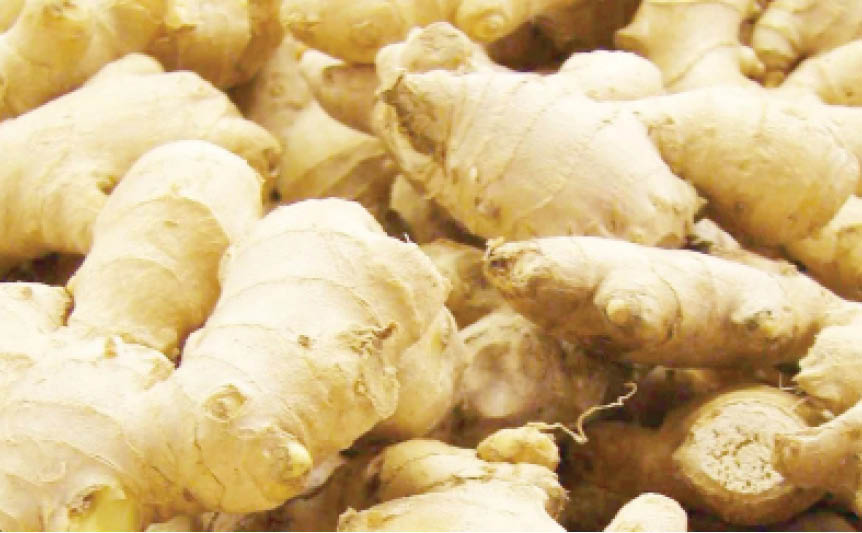In the last two years, a devastating fungal disease has been inflicting significant damage on many ginger farms in Nasarawa, Plateau, Federal Capital Territory (FCT) and southern Kaduna – a region in the heart of Nigeria’s ginger wealth.
The taste and pungency of Nigerian ginger are genuinely unparalleled, attracting global attention due to this special characteristic, which has been treasured for a long time.
The growing demand for ginger on the global market is fuelled by its growing appeal for both culinary and health purposes.
The Nigerian ginger is predicted to have a market value of $6.29 billionUS by 2030, up from $4.16bn in 2023. This represents a huge possibility for the country’s economic development.
- Channel palliatives to subsidise local productions, manufacturers urge FG
- Northern youths condemn communal disputes in Delta communities
The Minister of Agriculture and Food Security, Senator Abubakar Kyari, while inaugurating the taskforce, said it had become necessary to save ginger production in Nigeria, which is a critical component of the country’s agricultural produce.
Kyari said the taskforce would serve as the cornerstone of the country’s response, going forward, bringing together, the expertise of researchers, extension agents, and most importantly, the farmers to build a more resilient ginger industry.
“Specifically, the blight has caused billions of naira in losses, impacting not only the livelihoods of countless hardworking farmers but also Nigeria’s position as the world’s second-largest ginger producer.
“Our preliminary estimates suggest that affected farmers in southern Kaduna lost over N12bn, highlighting the significant financial blow.
“Furthermore, considering that over 85 per cent of Nigeria’s ginger cultivation occurs in this region, we can safely assume a substantial loss of cultivated land, potentially exceeding 70 per cent.
“However, let me assure you that amidst this rough patch, there is hope. The federal government, under the committed leadership of our farmer-friendly president, Asiwaju Bola Ahmed Tinubu, recognizes the critical role the ginger industry plays in our national economy and the profound impact this epidemic has had on our farmers.
“We are committed to supporting them and actively exploring ways to prevent future outbreaks,” the minister stated.
Sen Kyari believes that government’s action was informed by the role ginger plays in the Nigerian export earnings and the income of its farmers across the country.
“In line with Mr President’s directive to explore every avenue to mitigate the impact of the outbreak, especially with a view to revitalising the ginger subsector, sustainably stimulate the livelihood of the affected farmers and forestall future occurrences, on December 15, 2023, a roundtable discussion was convened by the Office of the Vice President, with key stakeholders: researchers from the National Root Crops Research Institute (NRCRI), representatives from the Nigerian Export Promotion Council (NEPC), the Kaduna State Government, International Institute of Tropical Agriculture (IITA), World Food Programme (WFP), Food and Agriculture Organisation (FAO), private sector ginger aggregators, and our dedicated producers
“In response to the ginger blight crisis, a multifaceted task force comprising of four committees was established in January this year. The Technical and Research Committee will be dedicated to understanding the disease and developing control measures to mitigate future re-occurrences.
“The Emergency and Recovery Committee will be focused on supporting farmers impacted by the failed season through needs assessments and transparent relief distribution. The Capacity and Productivity Committee will be empowering farmers for a stronger future by providing training, quality seeds and best practices to combat “ginger blight,” while also promoting sustainable practices and early disease detection,” he said.
During the event, the minister also said the Marketing and Industry Committee would be working to bridge the gap between Nigerian ginger and the local and global markets. This committee fosters collaboration with export destinations, ensuring regulatory compliance, and educating stakeholders for success.
The Taskforce Secretariat is expected to act as the central hub for planning, resource allocation, communication and progress evaluation.
N1.6b intervention for farmers
The minister announced that the task force, through the National Agriculture Development Fund (NADFund), was launching a N1.6bn recovery package for affected farmers, adding, “This swift action demonstrates our commitment to addressing this issue with urgency.”
Kyari said the ginger blight epidemic “serves as a stark reminder of the importance of preparedness in safeguarding our agricultural resources. By investing in research, extension services and farmer support systems, we can build a more sustainable future for our agricultural sector, ensuring Nigeria’s food security and continued success as a leading global ginger producer.”
Engineer Abdullahi, the chairman of the National Ginger Epidemic Control Task Force, has revealed that some committees are working behind the scene to salvage the ginger value chain.
He also stated that the task force is a national assignment that requires the necessary cooperation, and asked the minister to grant the task force the authority to co-opt members. The minister granted his request.

 Join Daily Trust WhatsApp Community For Quick Access To News and Happenings Around You.
Join Daily Trust WhatsApp Community For Quick Access To News and Happenings Around You.


